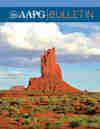High-precision seismic imaging for complex deep structures in the hydrocarbon exploration using a coherent-stacking-based least-squares migration
IF 2.5
3区 地球科学
Q2 GEOSCIENCES, MULTIDISCIPLINARY
引用次数: 0
Abstract
With the rapid development of the petroleum industry, oil and gas exploration gradually changes from conventional shallow and middle-depth reservoirs to deep and ultradeep reservoirs. In western China, especially in the Tarim Basin, the deep Ordovician and ultradeep Cambrian carbonate is the most important hydrocarbon reservoir. But because of complex near-surface conditions and complicated subsurface structures, high-precision seismic imaging for such deep and ultradeep reservoirs is still challenging with the state-of-art migration methods. One of the critical factors is that the reflections from deep and ultradeep strata cannot be coherently stacked in the migration because of accumulative traveltime errors caused by an inaccurate velocity model. To mitigate this issue, we present a coherent-stack-based least-squares migration (LSM) approach to improve the imaging quality for deep and ultradeep structures. Unlike traditional LSM that uses the stacked gradient during iterations, the proposed method updates the reflectivity model in the subsurface half-opening angle domain and then applies a coherent stacking to implement constructive summation for angle-domain common-image gathers. The new LSM scheme enables us to reduce the artifacts caused by an inaccurate velocity model and produces high-quality images for deep and ultradeep strata. Two models with typical steep-dipping faults, overthrust folds, and fault-karst carbonate reservoirs are designed to test the feasibility of the proposed method, and a field data set from a land survey is used to demonstrate its adaptability for low signal-to-noise ratio data.利用基于相干叠加的最小二乘迁移,为油气勘探中的复杂深层结构提供高精度地震成像
随着石油工业的快速发展,油气勘探逐渐从常规的浅层和中深层油气藏向深层和超深层油气藏转变。在中国西部,尤其是塔里木盆地,奥陶系深层和超深层寒武系碳酸盐岩是最重要的油气藏。但是,由于近地表条件复杂,地下结构复杂,用最先进的迁移方法对这类深层和超深层储层进行高精度地震成像仍然具有挑战性。其中一个关键因素是,由于速度模型不准确导致的累积走时误差,深层和超深层地层的反射在迁移中无法连贯叠加。为了缓解这一问题,我们提出了一种基于相干叠加的最小二乘迁移(LSM)方法,以提高深层和超深层结构的成像质量。与迭代时使用叠加梯度的传统 LSM 不同,所提出的方法更新了地下半开角域的反射率模型,然后应用相干叠加来实现角域共像采集的构造求和。新的 LSM 方案使我们能够减少因速度模型不准确而造成的伪影,并为深层和超深层地层生成高质量的图像。我们设计了两个具有典型陡倾断层、推覆褶皱和断层喀斯特碳酸盐岩储层的模型来测试所提方法的可行性,并使用了一个陆地勘测的野外数据集来证明该方法对低信噪比数据的适应性。
本文章由计算机程序翻译,如有差异,请以英文原文为准。
求助全文
约1分钟内获得全文
求助全文
来源期刊

AAPG Bulletin
工程技术-地球科学综合
CiteScore
6.60
自引率
11.40%
发文量
73
审稿时长
4.8 months
期刊介绍:
While the 21st-century AAPG Bulletin has undergone some changes since 1917, enlarging to 8 ½ x 11” size to incorporate more material and being published digitally as well as in print, it continues to adhere to the primary purpose of the organization, which is to advance the science of geology especially as it relates to petroleum, natural gas, other subsurface fluids, and mineral resources.
Delivered digitally or in print monthly to each AAPG Member as a part of membership dues, the AAPG Bulletin is one of the most respected, peer-reviewed technical journals in existence, with recent issues containing papers focused on such topics as the Middle East, channel detection, China, permeability, subseismic fault prediction, the U.S., and Africa.
 求助内容:
求助内容: 应助结果提醒方式:
应助结果提醒方式:


